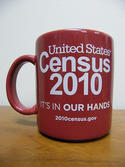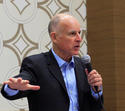Eurostat, the statistical agency of the European Commission (European Union) now designates metropolitan areas (Note) for the European Union (EU) and the European Three Trade Association (EFTA). The EU has 28 members, having just added Croatia, while the EFTA has 4 members. read more »
Newgeography.com - Economic, demographic, and political commentary about places
Young Tech Tycoons Pushing Left Coast Ahead Of East In Democratic Power Structure
There are two deep-blue regions that are critical to the Obama administration: the Northeast and the coastal region between San Jose and Seattle that truly deserves the moniker of the Left Coast. They dominate the Democratic donor list, and provide the administration with most of its appointees and much of its ideological moorings. read more »
Is the Census Bureau On Track For Another Estimating Fiasco?
When the 2010 Census results were released, a number of big cities had populations that were very off from what would have been expected based on the Census Bureau’s previous annual estimates of the population – sometimes grossly so. Some of these were related to cities that had challenged the estimates and had adjustments made in their favor, such as Cincinnati and St. Louis. Given that the Census Bureau seems to have approved every challenge, bogus challenges were all but encouraged. Still, there were significant variances in cities that didn’t challenge the Census, such as Chicago and Phoenix. read more »
Entrepreneurs Turn Oligarchs
For a generation, most Americans, whatever their politics, have largely admired Silicon Valley as an exemplar of enlightened free-market capitalism. Yet, increasingly, the one-time folk heroes are beginning to appear more like a digital version of President George W. Bush's “axis of evil.” In terms of threats to freedom and privacy, we now may have more to fear from techies in Palo Alto than the infinitely less-competent retro-Reds in North Korea. read more »
Can Kamaishi, Japan Recover From the Tsunami?
KAMAISHI, Japan - Two years after the disastrous 2011 earthquake and tsunami, most of the debris from the deluge has been cleared away in this small city on the northern edge of Japan’s tsunami coast. The cars and vans once piled on top of each other like some kind of apocalyptic traffic jam have been sorted out or sold for scrap. My guide, a local teacher who lost three of her aunts in the deluge, drives us up to a lookout. Spread out below us is the coastal village of Unosumai, or, more accurately, what once was the village of Unosumai. The view reminds me of pictures taken of Hiroshima after the atomic bomb had flattened almost everything. The only exception there was one surviving building, the former Industrial Promotion Hall in Hiroshima’s Peace Garden. read more »
How Can We Be So Dense? Anti-Sprawl Policies Threaten America's Future
Among university professors, government planners and mainstream pundits there is little doubt that the best city is the densest one. This notion is also supported by a wide number of politically connected developers, who see in the cramming of Americans into ever smaller spaces an opportunity for vast, often taxpayer-subsidized, profiteering. read more »
In the Spotlight: Higher Ed Degree Output by Field and Metro
It might stem from the dot-com crash, the increased popularity of certifications and onsite employer training, or various other reasons. Regardless, the key finding from EMSI and CareerBuilder’s analysis of higher education degree output over the last decade is still eye-opening: Computer and IT degrees completed in the U.S. have declined 11% since 2003. read more »
Distortions and Reality about Income Mobility
A ground-breaking study of intergenerational income mobility has the enemies of suburbia falling all over themselves to distort the findings. The study, The Spatial Impacts of Tax Expenditures: Evidence from Spatial Variation Across the U.S. (by economists Raj Chetty and Nathaniel Hendren of Harvard University and Patrick Kline and Emmanuel Saez of the University of California, Berkeley). Chetty, et al. read more »
- Login to post comments
The Childless City
What is a city for? Ever since cities first emerged thousands of years ago, they have been places where families could congregate and flourish. The family hearth formed the core of the ancient Greek and Roman city, observed the nineteenth-century French historian Fustel de Coulanges. Family was likewise the foundation of the great ancient cities of China and the Middle East. As for modern European cities, the historian Philippe Ariès argued that the contemporary “concept of the family” itself originated in the urbanizing northern Europe shown in Rembrandt’s paintings of bourgeois life. Another historian, Simon Schama, described the seventeenth-century Dutch city as “the Republic of Children.” European immigrants carried the institution of the family-oriented city across the Atlantic to America. In the American city until the 1950s, urbanist Sam Bass Warner observed, the “basic custom” was “commitment to familialism.” read more »
California's Blue-on-Blue Battle
Perhaps nothing more illustrates the evolving inner class conflict within the progressive political movement than the recent embrace of California as a role model for the rest of the country. The Golden State, maintains John Judis of the New Republic, should provide the game plan for the Obama administration as it seeks a path back to relevance. read more »






















